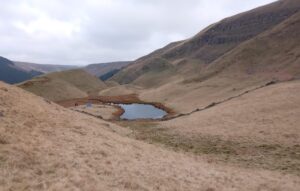Support us from £3/month
We deal with almost 1000 cases a year assisting communities, groups and individuals in protecting their local spaces and paths in all parts of England and Wales. Can you help us by joining as a member?
Following the judgment of the Supreme Court in Darwall v Dartmoor National Park Authority, we are calling on English and Welsh governments to legalise wild (backpack) camping on all open country.

Backpack camping in the Peak District National Park. Photo: Open Spaces Society
The court found that the Dartmoor Commons Act 1985 confers, on those entering on foot or horseback, a right to wild camp on the Dartmoor commons, and subject to the by-laws.
Says Kate Ashbrook, our general secretary: ‘What is valid for the Dartmoor commons is valid for our open countryside generally. We want the public to have a right to wild camp on access land designated under the Countryside and Rights of Way Act 2000 [the 2000 act] in England and Wales.
‘Everyone should be able, legally, to enjoy a night under the stars: in 2018 Julian Glover’s Landscapes Review, commissioned by the English government, recommended that every child should have a night under the stars in a national park or national landscape [area of outstanding natural beauty]. It’s time this was made a practical reality.’
Kate adds: ‘Camping is expressly excluded from the right of access under the 2000 act. But Defra ministers, and the Welsh ministers, can amend the restriction by regulations[1].
‘We propose that they do this so that genuinely-wild camping—away from public roads and car parks, and out of sight from where people live—would be by right[2] on remote or upland commons, and moorland generally. The right would apply only where walkers had carried their own equipment on their backs, stayed for one or two days, and left nothing but footprints.
‘We are pressing ministers to promote this act of simple liberation,’ Kate concludes.
[1]The restriction on camping is contained in para.1(1)(s) of Sch.2 to the Countryside and Rights of Way Act 2000. The power to amend the para.1 restrictions by regulations is contained in para.3, and in England, such regulations are subject to the affirmative-resolution procedure (see s.44(3)).
[2]At present, camping on access land designated under the 2000 Act puts the walker in breach of his or her right of access, and the walker may be asked to leave the access land.
